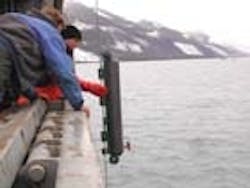EPA Authorizes Alaska to Assume Water Quality Permitting Authority
The U.S. Environmental Protection Agency (EPA) has approved the State of Alaska Department of Environmental Conservation's (ADEC) application to run the National Pollutant Discharge Elimination System (NPDES) permitting program in the state.
The NPDES permit program, a key part of the federal Clean Water Act, controls water pollution by regulating sources that discharge pollutants to waters in the U.S. EPA officials noted that while the official approval gives the State of Alaska responsibility for water quality permitting, EPA will continue its government-to-government relationship with tribes as it oversees the state’s permitting program.
By seeking and accepting the NPDES program, Alaska’s environmental regulators gain the authority to both write wastewater discharge permits for local businesses and industry, and enforce those permits to insure compliance with permit conditions.
"Alaska has achieved a significant milestone," said Elin Miller, EPA's regional administrator in Seattle. “Today, Alaska joins 45 other states that control water quality permitting for local waters. With that privilege comes the responsibility to administer a robust, well-funded program that produces strong, water quality-based permits. Hanging in the balance are Alaska's waters, which are among the most pristine in the United States."
“Our permits and efforts to protect water quality will be worthy of our tremendous water resources and their unique value to Alaskans,” said Larry Hartig, commissioner of the Alaska Department of Environmental Conservation (DEC). “We are particularly looking forward to making the permit program work for our rural residents who often have great interest and much to contribute when it comes to protecting water quality. Their voices must be heard. We also appreciate EPA’s efforts in helping us reach this important goal, along with the support of the state legislature, the public work group that helped us, and the many, many Alaskans who have contributed.”
Alaska's authority to write permits will be phased in over three years, while EPA will continue to write permits for those facilities that Alaska has yet to assume. Permits previously issued by EPA will remain in effect and become State APDES permits, administered and enforced by the ADEC.
Alaska plans to phase-in the permit program as follows:
• Phase I (upon delegation): domestic wastewater, timber harvesting, seafood processing;
• Phase II (one year after delegation): federal facilities, storm water, pretreatment;
• Phase III (two years after delegation): mining;
• Phase IV (three years after delegation): oil and gas, cooling water, all remaining facilities.
As part of the authorization agreement, EPA:
• Retains oversight of state’s program;
• Retains the right to review any permit;
• Retains the right to object to permits that are not protective and/or inconsistent with the Clean Water Act;
• Retains the right to federalize a state permit if the state does not adequately address EPA’s objection(s);
• Retains enforcement authority over all dischargers;
• Reserves the right to withdraw Alaska’s NPDES authorization if the state is not meeting Clean Water Act requirements; and
• Will conduct periodic program reviews.
Source: EPA
